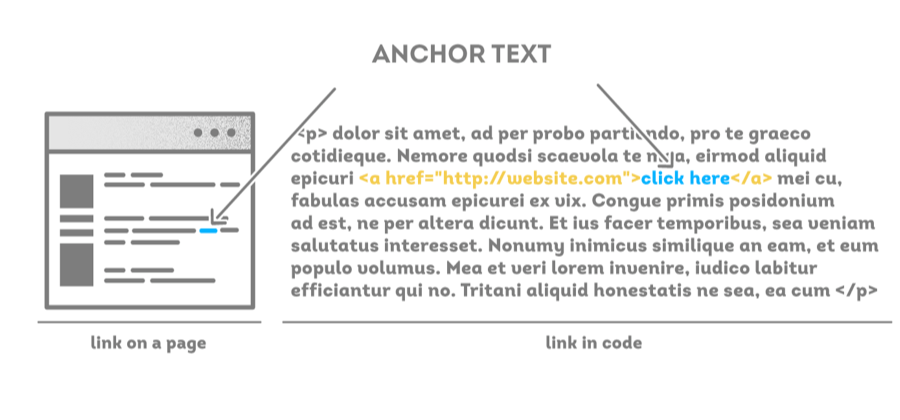Search Engine Optimisation (SEO) is something that every single brand needs. It is how you improve your website’s design, its user-friendliness, and, most importantly, how you can get onto the first page of Google’s results page. To put this into perspective, the first result on any given search will, on average, gain a third of the traffic. The second result will get around a fifth of the traffic. This means that half of all traffic will go to the first and second results, and the remaining traffic will be dispersed to the other eight results on the first page.
In short, if you aren’t on the first page, you won’t be seeing organic traffic from Google.
To better your search ranking, you need to focus on your SEO. One of the ways you will need to do this is to decide and focus on what anchor texts you will use. If you want help to understand this better, our anchor text guide is here to help.
What is Link Anchor Text?
The anchor text meaning in SEO is the words (or word) you have chosen to hyperlink within an article. The anchor text is important, as it is the keyword that Google will use to help understand your website, and it applies to both your on-site content and any backlinks. It is the coloured, underlined text you often see on web pages, and should be easy to spot.

What is Anchor Text in Link Building?
The anchor text link building articles looks exactly the same as the anchor text on your own website in that they are coloured and underlined, but the backlink anchor text you choose may differ depending on your strategy and goals. This will be looked at in more detail later on in the anchor article.
Anchor text vs hyperlink: What are the Differences?
You may be wondering what are anchor text and hyperlink differences if there are any at all. The anchor text is the text you see within the article and the clickable part of the link. However, it is the hyperlink that actually directs you to the new page. As an example, you may have the following:
Anchor Text: anchor building services
Hyperlink: www.clickintelligence.co.uk
Hyperlinks may come in other forms, such as buttons. Quite often, you will get click to text buttons, for example, and while these are hyperlinks, it means they are not anchor texts.
How to Write Anchor Text Effectively
Creating an SEO anchor text is as simple as choosing the keyword or tags you want and hyperlinking them to the relevant webpage. You do have to be careful, however, as anchor texts are a key part of any linking strategy, which means that if you do not adhere to Google’s guidelines, they could be used to penalise your website. Getting Google anchor links right must be your priority. If you aren’t sure whether you are doing this, then you need to reach out to SEO link anchor text experts.
To ensure that your website is in the clear and that any linking strategy is effective, always remember to:
- Ensure the link anchor text is relevant to your landing page.
- Put the link anchor text naturally in the article, as Google will pick up on strange or out-of-place keywords that sound too promotional.
What are the Different Types of Anchor Text?
Deciding on the anchor text you use can be difficult. However, it should be decided on what key phrase resonates with your business, what it is you are linking to, and what fits naturally. While agencies may have their own definitions, many are the same and are derived from the following list.
Exact-match: If you’re linking to a page on email marketing and your selected keyword is ‘email marketing,’ then ‘email marketing’ would exactly match what the link is about.
Partial-match: When the anchor text is a variation of the keyword given. For instance, for email marketing, it could be expanded to include ‘email marketing tactics.’
Branded: Your business’s brand name. When it comes to undercovering what is branded anchor text, it really is as simple as that.
Generic: A generic phrase. The generic anchor text list will have options such as ‘click here,’ “see more,” “find more information,” and “check here.”
Naked: The naked URL link, for example, www.clickintelligence.co.uk.
How To Choose Anchor Text
Deciding between an exact match anchor text, branded anchor text, partial match (or natural as many refer to it as) anchor text, and generic text can be tricky if you don’t know what is considered to be the best. Google uses your anchor text to understand what your page is about, so using a generic anchor text backlinks strategy might not be for the best. Instead, you may be better off using an anchor text SEO strategy that focuses on your top trending keywords for your industry. So, for digital marketers selling link building, you may focus on the keywords “link building services.”
If you want to build more trust and authority, focusing on branded anchors may be the better choice for you. Some experts will recommend that you avoid exact match because if you don’t do it right, you could end up with a penguin penalty. They also don’t look as natural and entice as many clickthroughs.
It can be helpful to see what your competitors are doing, and fortunately, there are handy tools out there like the Anchor Profiler.
Anchor Link Best Practices
If you want to ensure you have the best outcome with your anchor links, you need to do the following:
- Keep it natural – You need to avoid using the same anchor texts repeatedly, as it could result in a penalty. Bring versatility to your strategy.
- Avoid over-optimising – Spammy anchor texts will not go down well with Google.
- Keep everything relevant – If your anchor texts are not relevant to your site, you will find yourself causing more problems for yourself in the long term. This is why you should do a page anchor review often to ensure that no one has unknowingly or deliberately used a term that isn’t relevant to your brand.
- Avoid spammy sites – it is important that your brand isn’t associated with spammy sites. However, you will want to keep an eye on the sites that you do have links from, even the most high-quality ones. One of the most common things to happen is fraudulent DMCA backlink takedowns. They will try to have your high-quality links removed by emailing to say it is infringing copyright.
- Get the right anchor ratio – anchor text ratios should be along the following lines: At least 50% should be branded anchor texts, 15% should be your website name, between 10-20% can be naked anchor texts, 1-5% can be generic, and 1-5% can be exact. If you nail this anchor text ratio, you are more likely to have success.
The Value of Linking Strategies
Anchor text is a key part of any linking strategy. Just as you would research for keywords when conducting any Pay-Per-Click advertising campaign, so too do you need to research which anchor text options you should use. Where these backlinks or hyperlinks appear is also important. You will want to have them on both your own website as internal links, and on other websites as backlinks. The more backlinks you have from quality pages that have a high Domain Authority, the better, so make sure to consider your anchor text strategy. You can achieve this through merit and content marketing, or by using our link building services – when you come to us, you won’t ever have to worry if you are doing the right type of anchor text backlink strategy.
Get Help on Your SEO Anchor Text Strategy
Your anchor texts are imperative when it comes to improving your Google ranking. As you would be with keywords, and when conducting your research on the best ones to use, be sure to do the same with your anchor texts. Hyperlinking the wrong phrase can not only harm your overall ranking in the SERPs, but it can also cause red flags, which Google could use to penalise you.
